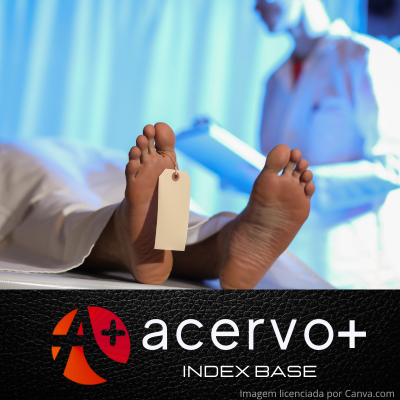Sobre a morte e o morrer: ressignificando perspectivas de estudantes da área de saúde pelo impacto da educação em tanatologia
##plugins.themes.bootstrap3.article.main##
Resumo
Objetivo: Investigar se estudantes da área de Saúde submetidos a uma intervenção pedagógica se tornaram mais confortáveis, capacitados e humanizados nas ações e reações perante a morte e o morrer. Métodos: Para realizar o estudo, foi empregada a metodologia qualitativa descritiva, utilizando-se o método etnográfico interpretativo. As técnicas de pesquisa aplicadas incluíram a observação direta, com anotações em diário de campo dos dados não verbais, e a entrevista semiestruturada, que seguiu um roteiro específico. Os dados coletados por meio das anotações e das gravações das entrevistas foram sistematizados e, em seguida, analisados por meio da técnica de análise temática. Resultados: Ficou evidente que predominava nos estudantes um contexto de insegurança, vulnerabilidade, ansiedade e dificuldade para lidar com o inevitável. Contudo, através da intervenção pedagógica, os estudantes descreveram transformações importantes em suas perspectivas a respeito do morrer, tornando-se mais confiantes, seguros, capazes e humanos no convívio com essa realidade. Por mais, defenderam a inclusão de forma abrangente desse tipo de iniciativa no ensino superior brasileiro. Conclusão: Conclui-se que a educação em Tanatologia é importante na formação dos acadêmicos da área de Saúde e que, portanto, as instituições de ensino superior devem considerar sua inclusão nos currículos acadêmicos.
##plugins.themes.bootstrap3.article.details##
Copyright © | Todos os direitos reservados.
A revista detém os direitos autorais exclusivos de publicação deste artigo nos termos da lei 9610/98.
Reprodução parcial
É livre o uso de partes do texto, figuras e questionário do artigo, sendo obrigatória a citação dos autores e revista.
Reprodução total
É expressamente proibida, devendo ser autorizada pela revista.
Referências
2. BAILE WF, et al. SPIKES—A Six-Step Protocol for Delivering Bad News: application to the patient with cancer. The Oncologist, 2000; 5(4): 302-311.
3. BARTON D, et al. Death and dying: a course for medical students. Journal Of Medical Education, 1972; 47(12): 945–951.
4. BLACK D, et al. Educating medical students about death and dying. Archives Of Disease In Childhood, 1989; 64(5): 750-753.
5. BRAUN V e CLARKE V. Using thematic analysis in psychology. Qualitative Research In Psychology, 2006; 3(2): 77-101.
6. BUCKMAN R. Breaking bad news: why is it still so difficult? Bmj, 1984; 288(6430): 1597-1599.
7. CERIT B. Influence of Training on First-Year Nursing Department Students' Attitudes on Death and Caring for Dying Patients: A Single-Group Pretest-Posttest Experimental Study. Omega - Journal Of Death And Dying, 2017; 78(4): 335-347.
8. DEZUTTER J, et al. The role of religion in death attitudes: distinguishing between religious belief and style of processing religious contents. Death Studies, 2008; 33(1): 73-92.
9. FERGUSON KA, et al. A Multimethod Examination of Medical Students' Experiences With Bereavement and Complicated Grief. Omega (Westport), 2023;88(2): 668-689.
10. GÜL Ş, et al. Nursing Students’ Experiences With Death and Terminal Patients During Clinical Education. Omega - Journal Of Death And Dying, 2020; 85(3): 628-649.
11. HEGEDUS K, et al. Effect of end of life education on medical students’ and health care workers’ death attitude. Palliative Medicine, 2008; 22(3): 264-269.
12. HULL FM. Death, dying and the medical student. Medical Education, 1991; 25(6): 491-496.
13. KELLY E e NISKER F. Medical students’ first clinical experiences of death. Medical Education, 2010; 44(4): 421-428.
14. LEWIS EG, et al. “We never speak about death.” Healthcare professionals' views on palliative care for inpatients in Tanzania: a qualitative study. Palliative And Supportive Care, 2017; 16(5): 566-579.
15. MARCUS JD e MOTT FE. Difficult conversations: from diagnosis to death. Ochsner Journal, 2014; 14(4): 712-717.
16. RHODES-KROPF J, et al. "This is just too awful; I just can't believe I experienced that...": medical students' reactions to their "most memorable" patient death. Academic Medicine, 2005; 80(7): 634-640.
17. SANTOS TF e PINTARELLI VL. Educação para o Processo do Morrer e da Morte pelos Estudantes de Medicina e Médicos Residentes. Revista Brasileira de Educação Médica, 2019; 43(2): 5-14.
18. WENRICH MD, et al. Dying Patients' Need for Emotional Support and Personalized Care from Physicians. Journal Of Pain And Symptom Management, 2003; 25(3): 236-246.
19. WILLIAMS CM, et al. Dying, Death, and Medical Education: student voices. Journal Of Palliative Medicine, 2005; 8(2): 372-381.
20. YE WQW et al. The impact of patient death experiences early in training on resident physicians: a qualitative study. CMAJ Open, 2023;11(5):E1006-E1011.

